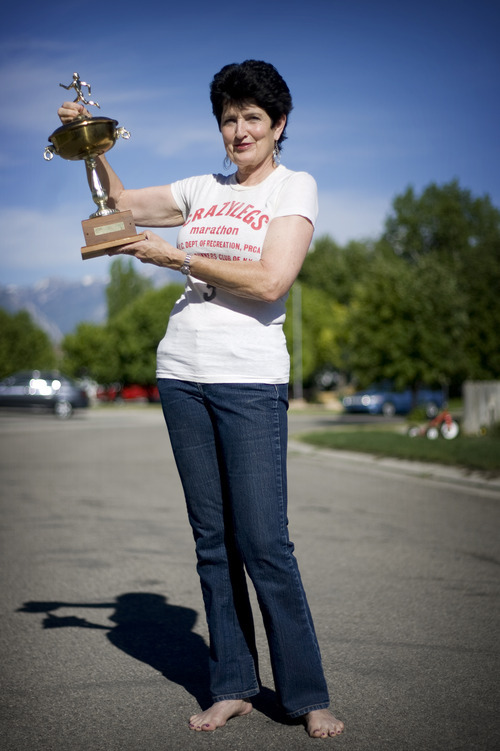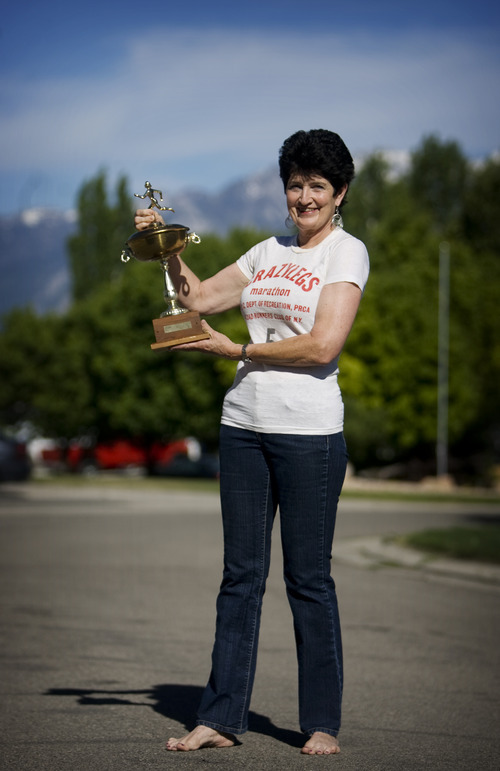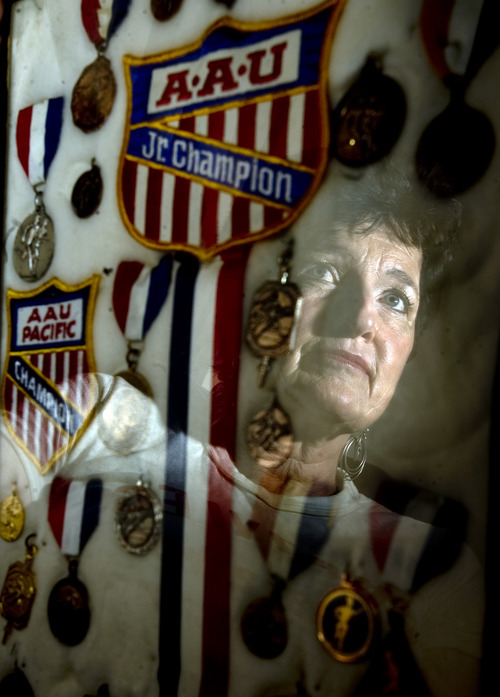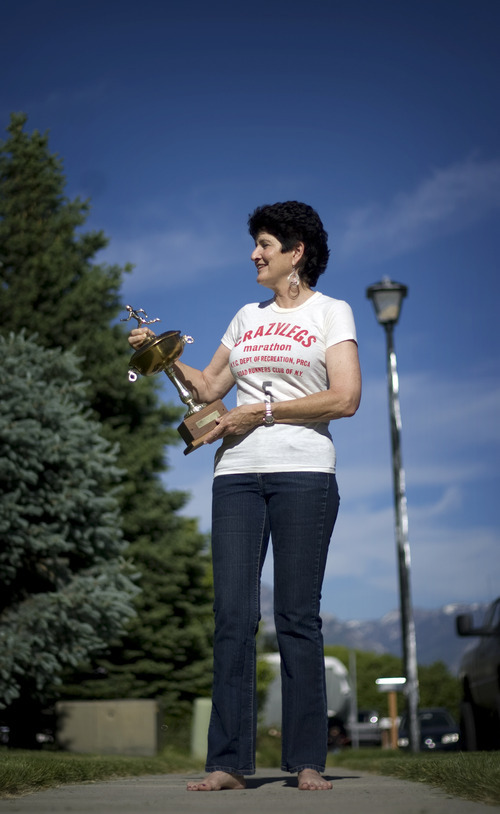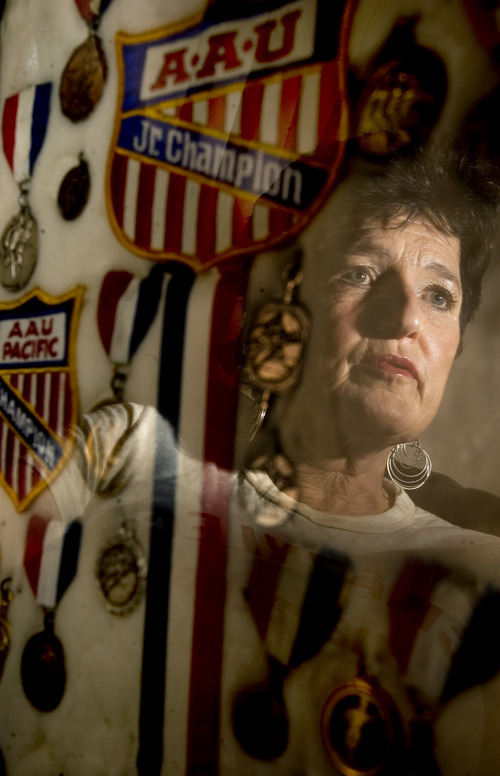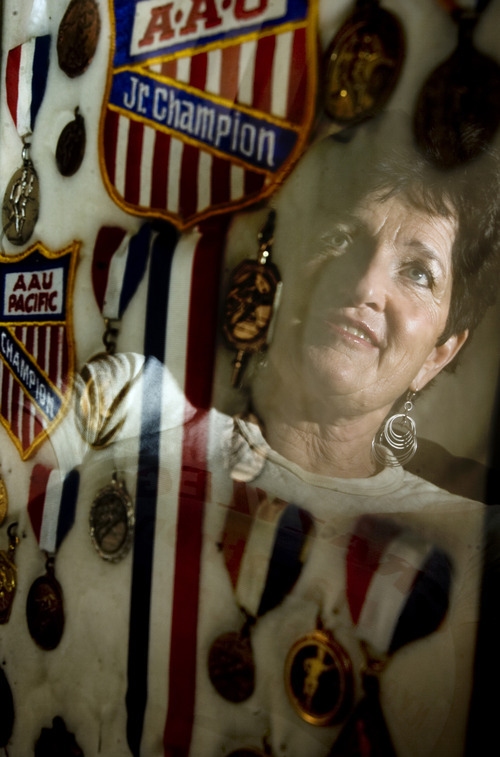This is an archived article that was published on sltrib.com in 2012, and information in the article may be outdated. It is provided only for personal research purposes and may not be reprinted.
West Jordan • In 1984, doctors diagnosed 29-year-old Jacki Dixon with cardiomyopathy and told her she had two years to live. This week, Dixon heads to New York City to celebrate the 40th anniversary of the Crazylegs Mini race — the first women's long-distance race in the nation, which Dixon handily won.
Dixon, who grew up at a time when women's athletic opportunities were limited, fell in love with long-distance running when she was 12.
That was 1967, when the longest distance girls could run in track competitions was one mile or 1,500 meters, Dixon said. In cross-country competition, the distance was 1 ½ miles.
By 1972, track distances were increased to two miles or 3,000 meters, and cross-country to 2 ½ miles. Women who wanted to run farther in competitions had to sign up for men's road races.
She remembers being the lone female in several such events, which she entered as "Jack Dixon" if they were sticklers for the "men only" rule.
"No one really ever gave me a problem once I got there," Dixon said.
Long-distance running soothed and fed her spirit, she discovered. "The drive that it takes to push yourself, it's all because, for whatever reason, you're addicted to it."
Her motivation? "I came from a home of domestic violence and I was very insecure, a very frightened person." Distance running allowed her to "be a different person in a different environment."
As part of the San Jose Cindergals, a diverse track team coached by Augie Arbabright, Dixon said she broke the five-minute mile but that her real strength lay in her stamina.
Argabright, who became a father figure to Dixon, later launched San Jose State University's first women's cross-country team.
"On Sundays, I had a 16-mile loop from my house up into the foothills of Los Gatos and Saratoga," Dixon reminisced. She would first run the loop with Francine Larrieu, and later the same day with another group. Larrieu went on to become a five-time Olympian.
"This is what was so frustrating," Dixon said in an interview at her West Jordan home. "I was doing the distance and I was being told … that women weren't strong enough to do it, that we did not have the physical or mental capabilities to endure that kind of distance."
When the first six-mile race for women came along in 1972, Dixon seized the opportunity.
—
Miniskirts and Playboy bunnies • "It was fairly groundbreaking back then," said Richard Finn, spokesman for the New York Road Runners (NYRR), a nonprofit that sponsors 50 running events each year, including the famed Mini and the ING New York City Marathon.
He said the race debuted three weeks before the passage of Title IX, federal legislation that opened the door for funding and expansion of women's athletic programs in schools and universities across the country.
"Here we were saluting the strength of women and their bodies, but we still had to find a sexist name for the race," Finn said. "But it stuck."
In fact, Mini founder Fred Lebow further hyped that first race by having a couple of Playboy bunnies run the first 100 yards, Finn added.
Because the six-mile Crazylegs Mini — named for Crazylegs shaving gel and the miniskirt — has continued for four decades, Finn said grandmothers, mothers and daughters often run the 10K (6.2-mile) race together.
The maiden Mini in 1972 had 78 entries, 72 of whom completed the race. Dixon — rated No. 5 — won with a time of 37:02. This year, close to 8,000 women have signed up for Saturday's run through Central Park.
This week, Dixon travels back to New York with daughter-in-law Lanese Hendrickson and granddaughter Tali Bryn Hendrickson to participate in the fanfare. She savors the trophy she won 40 years ago, but today's winner gets a cash prize of $10,000, Finn said.
—
Battling a death sentence • When she was in her late 20s, Dixon heard that women might soon be able to compete in the Olympic marathon, so she began training again and soon regained the conditioning that allowed her to consistently run six-minute miles. She entered her first and only marathon, called the "Summit," which traversed a mountain pass between Los Gatos, Calif., and the Pacific Ocean.
A week before that wildly anticipated race, Dixon fell ill.
"I ran the marathon with the flu, and had a temp of 101 [degrees]" Dixon said. "I was not going to not run it."
She came away disappointed with her 3-hour, 12-minute time, having hoped to finish in under three hours.
"Unbeknownst to me, that flu triggered a disease that runs in my family called cardiomyopathy," Dixon said. The progressive disease weakens heart muscles, disrupts electrical signals within the heart, and decreases the organ's efficiency, often leading to sudden death.
In 1984, doctors gave Dixon — then the mother of a 10-year-old son — a pacemaker and the frightening prognosis that she had two years to live.
Terrified, Dixon spent several despondent months, but a shared bond with a fellow dog lover helped her begin to get out and live again. Not long after, she bought an Arabian show horse and soon had seven of them in her California pasture.
"When you can't run, you look for something to feel as passionate about," Dixon said. Her disease took her on a roller-coaster ride of good and bad years, during which Dixon's name almost landed on the heart transplant list twice.
In 2003, with a cardiac output of only 30 percent and her heart's electrical pathways "shutting down," Dixon sold her beloved horses. She qualified for a new biventricular pacemaker, which immediately improved her circulation.
In 2004, she became a grandmother and moved to West Jordan to be near her son Ty Hendrickson and his wife and daughter. Dixon also launched her own jewelry business, Rabbask Designs, stringing antique and precious beads into stunning works of art.
"It takes a forceful will and a love of life to keep going," said Dixon, laughing and seemingly full of vitality as she prepared for her trip to New York.
Finn said he is thrilled she'll be there for the 40th running of the Mini.
"She's got a competitor's heart," Finn said. "She shared her health issues and challenges with us and it shows what kind of fighter she is and the spirit she has even today."
twitter:@catmck


